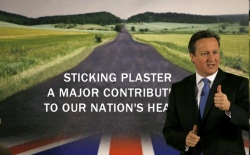 The election manifestos have been delivered, like tickets from a parking machine, along with their announcement speeches. Perhaps Dr No has a forgotten cotton wool bud stuck in each ear, but it seems to him that the tones and voices of the three main party leaders are doing a sort of verbal regression to the mean, and are becoming increasingly difficult to tell apart. Sometimes the content provides distinction, sometimes it doesn’t. The smaller parties, as they are politely known, on the other hand, tend to have distinctive voices. We all know who has taken the Hay Rood, and who is behind all that farfing and barfing. Mostly lacking any realistic prospect, the smaller parties can indulge their creative sides, and entertain us with curious pledges, like the one to nationalise bluebell woods, or reverse the smoking ban in schools, the better to turn nippers into Kippers.
The election manifestos have been delivered, like tickets from a parking machine, along with their announcement speeches. Perhaps Dr No has a forgotten cotton wool bud stuck in each ear, but it seems to him that the tones and voices of the three main party leaders are doing a sort of verbal regression to the mean, and are becoming increasingly difficult to tell apart. Sometimes the content provides distinction, sometimes it doesn’t. The smaller parties, as they are politely known, on the other hand, tend to have distinctive voices. We all know who has taken the Hay Rood, and who is behind all that farfing and barfing. Mostly lacking any realistic prospect, the smaller parties can indulge their creative sides, and entertain us with curious pledges, like the one to nationalise bluebell woods, or reverse the smoking ban in schools, the better to turn nippers into Kippers.
So too can we welcome back after his operation the BBC’s very own Nick Robinson, who is to election coverage what David Vine was to Winter Olympic coverage: full of enthusiasm, but inclined to lack focus. In its way, the campaign race is not unlike a downhill event. The party hopefuls launch themselves at the top, and hurtle down towards the finishing line, with Nick providing the commentary. Away from Whitehall, we lack Nick’s nightly peering with a torch into a bottle-bank outside Number Ten experience, but that is for now compensated for by the nightly brightly lit spectacle of studio election coverage. Sitting at the centre of the BBC’s nightly web of television coverage is Hoo Wedwards, who runs the show as if he were calling in Eurovision Song Contest reports. Come May 7th, Hoo will be replaced by Dimbers D, who will call in the real results. “Daffid, this is Llengengerwellen calleen…”
The trouble with pledges is that they are just that: pledges. However hard hard working politicians work at polishing them, the pledges are no more durable than our reflections in a polished glass window: once we look away, they are gone. We don’t need long memories to remembers how Tory pledges of no top down reorganisation of the NHS became a Tory led reorganisation so big it could be seen from space. Like parking tickets, it seems election manifestos and pledges expire, with the current lot set to expire at or about midnight on May 7th.
Just as there is no consensus on who – or indeed what – is likely to win the election, so there is no consensus on the pivotal battleground. For some it is the economy, and it is fair to say that without a working economy with tax receipts the NHS is going to struggle even more than it is now; for others it is the NHS. Or Trident. Or immigration. Or bluebell woods, or even Kippers. Nonetheless, all the parties have High Hopes for NHS – not to do so is a political bootstrap into oblivion – but what matters here is not ephemeral High Hopes, but the guidance learned from hard experience. We know that Labour tend to be more generous to the NHS, not just with money, but also, unfortunately, with over-management. We know that the Tories tend not to be too ungenerous with money, but have unfortunate ideological hots for fragmentation, and all that that implies.
Just as the moon has a dark side, so to does May 7th. No one knows what will happen after the election. David Nicholson, the NHS observer from space, has recently suggested the dark side has black hole in it, and though he did not say the words, the implication was the hole is, so to speak, so big it can be seen from somewhere else in space. We have passed through the early easy orange squeezing days of milking efficiency savings out of the NHS, and are about now in the eye-watering pip-squeaking lemon squeezing days. Come the dark side of May 7th, we will soon approach and then be in water out of a stone country. If the NHS big picture is what fires your election rocket, then you need to vote for the party that will both give the NHS the money it needs and manage it with the humane efficiency it needs. Today, our hard working politicians from the main parties offer us a choice between over-management or fragmentation. Neither is an engaging prospect.
